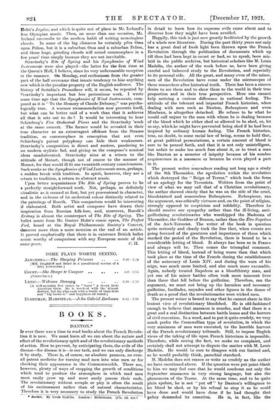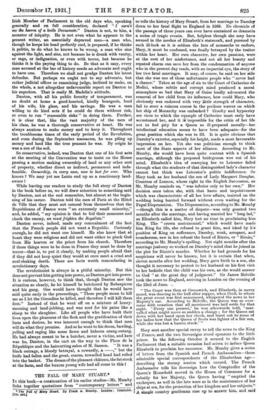BOOKS.
DANTON.*
IF ever there was a time to read books about the French Revolu- tion it is now. We must learn all we can about the nature and effect of the revolutionary spirit and of the revolutionary methods of action. How to prevent, by anticipating them, the evils of the disease—for disease it is—is our task, and we can only discharge it by study. There is, of course, no absolute panacea, no cure- all patent medicine for turning mad men into wise men or for checking their appearance in the Commonwealth. There are, however, plenty of ways of stopping the growth of conditions which tend to produce the atmosphere in which mad men most easily grow up and most easily pursue their ends. 'The revolutionary without scruple or pity is often the result of his environment rather than of natural characteristics. Therefore it is very necessary to study the French Revolution
• Denton. By Louie Madelln. London : Heinemann. [17a. ed. net.1
in detail to learn how its supreme evils came about and to discover how they might have been avoided.
Happily, this task is just now greatly facilitated by the growth of a whole new literature. During the past thirty years not only has a great deal of fresh light been thrown upon the French Revolution through the publication of documents which up till then had been kept in secret or had, so to speak, been mis- laid in the public archives, but historical scholars like M. Louis Madelin, the author of the work before us, have been giving careful and balanced study to the Revolution, and especially to its personal side. All the great, and many even of the minor, men of the Revolution have come under the microscopes of these researchers after historical truth. There has been a sincere desire to see them and to show them to the world in their true proportion and in their true perspective. Here one cannot help noticing a curious difference in national feeling. The attitude of the tolerant and impartial French historian, when dealing with men such as Denton, Robespierre and even Mirabeau, is altogether detached: He refuses to be what he would call unjust to the man with whom he is dealing because of the blood which he either shed or allowed to be shed, or, let us say, which he might have prevented being shed if he had been inspired by ordinary human feeling. The French historian, true, no doubt, to some racial law of being, seems to hold that, at great political permutations, a certain amount of blood is sure to be poured forth, and that it is not only unintelligent, but unfair to make too much fuss about it, or to treat a man like Denton as a monster of iniquity because of his sombre acquiescence in a massacre or because he even played a part in it.
The present writer remembers reading not long ago a study of the 9th Thermidor, the %volution within the revolution which destroyed the " Reign of Terror," which took the form of an apology for the Terrorists. Written from the point of view of what we may call that of a Christian revolutionary, the author showed clearly that he was on the side of the cruel, bloodstained and remorseless Robespierre. Robespierre, ran the argument, was ethically virtuous and, on the point of religion, strongly opposed to scepticism and infidelity. Therefore he should receive our sympathy rather than the ill-living, anti- guillotining revolutionaries who worshipped the Madonna of Thermidor, the Goddess of Reason, rather than the Etre Supreme of the Arch-Terrorist. The writer of the book in question quite seriously and clearly took the line that, when events are going forward of the greatness and importance of those which. marked the period of the Revolution, there is bound to be a considerable letting of blood. It always has been so in France and always will be. Then comes the triumphal comment. This letting of blood, instead of being worse than that which took place at the time of the Fronde during the establishment of the autocracy of Louis XIV. and during the wars of his reign, was much more limited, and also much more excusable. Again, nobody treated Napoleon as a bloodthirsty man, and yet one of his minor battles often took more innocent lives than those that fell before the guillotine. Therefore, ran the argument, we must not bring up the harmless and necessary guillotine, fusillades, noyades and other figures in the dance of death as a proof that the revolutionaries were wicked men.
The present writer is bound to say that he cannot share in this lenient view of revolutionary bloodshed. He is old-fashioned enough to believe that massacre is murder, and that there is a great and a real distinction between battle losses and the horrors e of civil execution. In a word, and to put it quite crudely, we very much prefer the Cromwellian type of revolution, in which the very minimum of men were executed, to the horrible harvest of the French revolutionary tribunals. Still, to impose English views of the taking of life upon French historians is impossible. Therefore, while noting the fact, we make no complaint, and certainly shall not attempt to dispute the matter with M. Louis Madelin. He would le sure to disagree with our limited and, as he would probably think, parochial standard.
M. Madelin does not reason or write as crudely as the author we have mentioned above. If the question were put point-blank to him we may feel sure that he would condemn not only the September massacres in very strong language, but also the phenomena of the Terror. At the same time, and to be quite plain spoken,' he is not " put off " by Danton's willingness to let blood be shed, or by his refusal to stop it as he could have done and would have done if he had thought that policy demanded its cessation. He is, in fact, like the Irish Member of Parliament in the old days who, speaking generally and on full consideration-, declared " I carn't see the harrm of a leetle Deenamete." Danton is not, to him, a monster of iniquity. He is not even what he appears to the present writer, an essentially depraved man—a man who, though he keeps his head perfectly cool, is prepared, if he thinks it politic, to do what he knows to be wrong, a man who sins against the light, and dna, not because he is drunk with vanity, or rage, or indignation, or even with terror, but because he thinks it is the paying thing to do. Be that as it may, every man accused at the bar of history needs an advocate and ought to have one. Therefore we shall not grudge Danton his latest defender. But perhaps we ought not to say advocate, but rather judicial officer or examining judge, inclined to make, on the whole, a not altogether unfavourable report on Minton to his superiors. That is really M. Madelin's attitude.
Danton, with all his public ferocity of temperament, was no doubt at home a good-hearted, kindly bourgeois, fond of his wife, his glass, and his savings. He was a man willing to do kind acts if he could do them without risk, or even to run " reasonable risks " in doing them. Further, it is clear that, like the vast majority of the men of his class, he was a thorough conservative at heart. He was always anxious to make money and to keep it. Throughout the troublesome times of the early period of the Revolution, and even during the September massacres, he was piling up money and land like the true peasant he was. By origin he was a son of the soil.
So conservative, indeed, was Danton that one of his first acts at the meeting of the Convention was to insist on the House passing a motion making ownership of land or any other sort of property, whether direct or indirect, permanent and inde- feasible. Ownership, in every case, was to last for ever. Who knows ? We may yet see Lenin end up as a reactionary land- owner !
While leaving our readers to study the full story of Danton in the book before us, we will draw attention to something said by Danton, not at the end remember, but almost at the begin- ning of his career. Danton told the men of Paris at the Hotel de Ville that they must not conceal from themselves that the Republicans of Fiance were " an extremely small minority," and, he added, " my opinion is that to foil their measures and check the enemy, we must frighten the Royalists."
Danton never, indeed, made any concealment of the fact that the French people did not want a Republic. Curiously enough, ho did not want one himself. He also knew that at heart they were religious and did not want either to pluck God from His heaven or the priest from his church. Therefore if these things were to be done in France they must be done by terror—that is, to put it clearly, by making people afraid that if they did not keep quiet they would at once meet a cruel and soul-shaking death. These are facts worth remembering in revolutionary days.
The revolutionist is always in a pitiful minority. But this does not prevent him getting into power, as Danton got into power. It is curious, however, to think that, though Danton saw the situation so clearly, he let himself be butchered by Robespierre and his gang. One would have thought that he would have said quite early in the proceedings, " These people mean to kill me as I let the Girondins be killed, and therefore I will kill them first." Instead of that he went off on a mixture of honey- mooning and land-jobbing, and was sent for his pains like a sheep to the slaughter. Like all people who have built their lives upon the pleasures of the flesh and the gratification of their lusts and desires, he was innocent enough to think that men will do what they promise. And so he went to his doom, bawling, yelling and raging like some fierce and hideous orang-outang. He had always meant to be a butcher, never a victim, and here was he, Danton, in the cart on the way to the Place do la Republique and the haircutting salon of M. Sanson. " It was a black outrage, a bloody betrayal, a cowardly, a —," but the knife had fallen and the great, coarse, towselled head had rolled into the basket. The dream of the pleasant chtiteau, the fat stock at the farm, and the buxom young wife had all come to this 1







































 Previous page
Previous page